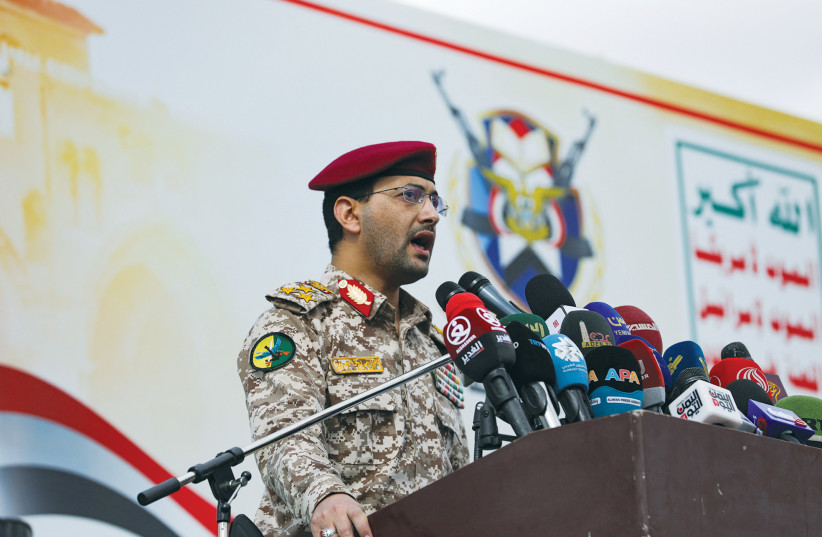The ongoing war in the Gaza Strip has revealed a massive power vacuum in the Middle East. The clearest evidence of this is the chaos caused by terrorist militias scattered across Yemen, Iraq, and Syria, with no deterrent force in sight. This chaos is taking without a single international power – let alone the international community as a whole – being able to mobilize the resources needed to end these militias’ attacks.
One of the developments that caught my attention recently, reflective of the vacuum and chaos, was the announcement by the Houthi terrorist group that it had carried out a hypersonic missile test. The group confirmed that the missile had reached a speed of around 10,000 km/h and that it plans to produce it for use in the Red Sea. The Houthis claim that they have been testing for three months in order to develop the missiles and increase their performance and efficiency.
With this nonsense, they assume that others will be naive enough to believe that, just like that, they have acquired the military capabilities that have taken the great powers years to develop.
Whether it is this development that has prompted the Biden administration to enter into indirect talks with Teheran to contain the Houthis is unclear. What is clear, however, is that this is a demonstration of what chaos can do in a region full of crises and self-destructive factors.
A new arms race?
The possibility of the Houthis developing advanced weapons on their own is an issue far more complex issue than it would appear, especially in an environment that lacks the sophisticated technology needed to develop drones or missiles.

What’s more, the missiles in question are hypersonic which only a few countries have in their arsenal, namely the US, China, Russia, North Korea, and more recently, Iran. This raises many questions, especially as the Islamic Revolutionary Guard Corps (IRGC) recently unveiled the Fattah hypersonic missile, which can travel at up to 15 times the speed of sound, has a range of 1,400 km. and is capable of evading air defense systems.
The Houthi announcement was greeted with skepticism by several military experts. How could the Houthi group have developed such advanced technology under conditions that are widely known? Whether the Houthis’ announcement is true or not, it is a sign that the Middle East has little positive to look forward to in the foreseeable future.
The inability of Americans and Westerners to maintain security and uphold international law has allowed militias to spread chaos across the region. This is a sign of great evil to come.
It would not be wise to accept a terrorist militia attacking Israel with sophisticated missiles, as this could lead to a stronger response that would result in severe revenge and anger from a nuclear-capable state, whether it admits it or not.
There are important signs of what is happening in the Middle East, foremost among which is that some regional parties are misjudging the current international polarization and taking many risks. The impression is that the American era, and with it the Western era, has come to an end and that the tide has turned. The opportunity is ripe for these parties to redraw the map of the region according to their own notions.
The weakness of the West coincides with a strategic retreat on the part of the Arabs, the reasons for which are well known, and the situation could worsen if the conflict in Ukraine escalates and decisions are made to send forces into confrontation with Russia instead of accepting the reality and seeking to negotiate an end to that ongoing war.
Proof of this possibility is that there is a European current, led by French President Emmanuel Macron, calling for Russia to be prevented from winning in Ukraine, moving to controversial proposals such as “the possibility of a deployment of Western troops on Ukrainian territory to put an end to the Russian invasion,” with US military support currently held up in Congress.
IN SHORT, the potential complexity of the Ukrainian crisis could lead to more chaos in the Middle East. This serves the interests of terrorist militias and their sponsors and supporter states and organizations all over the world, especially as there are signs that the Gaza war has strengthened Iran’s influence and strategic role in shaping the equations of regional stability. The Gaza war has also had an impact on American influence in the world, as the US has been forced to focus its attention and adjust its strategic priorities in the Middle East region, at least for the time being.
The Gaza war has also reshuffled the cards and highlighted the danger of a power vacuum emerging in this chaotic region, especially after the US strategic shift in its Middle East presence and the reluctance of other international powers to fill this vacuum due to considerations linked to their strategic interests and priorities.
China is still wary of intervening directly to defend its interests, concerned about premature interference in the Middle East’s complex conflicts. Russia is consumed by its war in Ukraine and does not want to open new fronts with the United States and the West, amid calls for NATO troops to be sent to Ukraine.
Above all, there is no indication that the Arabs and Israel will find an appropriate formula to ensure the security and stability of both sides as part of a solution to containing the Iranian threat and the so-called axis of resistance, which in their absolute interest under current conditions.
The writer is a UAE political analyst and former Federal National Council candidate.
